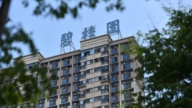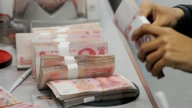【新唐人2014年02月11日讯】进入2014年以来,中国大陆一线城市土地市场热度不减,“地王”频现。但房屋市场却出现有价无市的尴尬情形,1月楼市成交量甚至下跌过半。同时,中小城市的楼市崩盘案例也不断增加,寒意甚浓。地产大佬任志强10几年来首度提及房市风险。中共党媒更是罕见发文说:中国房地产泡沫崩溃时间就在今、明两年。
进入2014年,北京房市也遭遇寒冬。与去年同期相比,1月份北京新建商品房签约量大幅下降53.9%。二手房的成交量环比下降20.1%,同比下降55.2%。成交均价环比下降1.87%。这已经是北京二手房成交量、价,连续两个月出现下滑。
同样,广州楼市也是一片低迷。大陆媒体报导,1月份全市新建商品房成交量环比下跌16%,同比下跌48%,创下了去年1月以来的最低成交量。中心区楼价环比下降达10%。
美国南卡罗来纳大学教授谢田:“北京、广州、深圳等一线城市新房和旧房的成交量都在巨幅下滑,这实际上可能就是中国楼市全面崩溃的开始。”
但即便房屋销售遭遇寒冬,各大城市的土地市场依然热度不减,成交额偏高。其中仅北京、上海、深圳、杭州四个城市的土地出让金就已经突破一千亿元,各地“地王”接连出现。这显示一线城市的房市虚火还在上升、高烧依然不退。
大陆财经评论专家“牛刀”日前发表博文《中国房地产面临全线崩溃》,其中谈到,中国房地产的操盘手现在仍然幻想,像2009年那样,用“地王”来刺激提升房价上涨,这是典型的黔驴技穷。
“牛刀”谈到,民间统计数据显示,在600个三、四线城市中,去年有360个城市的房价下跌,有些甚至跌去50%。
2月8号,中共党媒《新华网》罕见刊文表示﹕“专家称,中国房地产泡沫崩溃时间,就在今、明两年。”凸显大陆房地产问题的严重和紧迫。
另据美国《大纪元时报》中文网报导,中国新年前夕,山东省某县政府向工作人员布置了一项特殊任务,要求他们:在2014年必须帮助售出两套新建商品房。这也是继鄂尔多斯等地陆续出现“鬼城”之后,大陆房市危机的又一“奇特风景”。
此外,土地销售也成为这些城市的难题。据统计,2014年主要靠卖地还债的地方政府需要偿还债务2.万3800亿元。有国土局工作人员表示,有些出售地块条件不好,但也得想办法联系开发商、把地卖出去。
谢田:“中国房地产的破灭,我预计应该是从二线、三线城市大面积开始,慢慢也会影响到一线城市。”
谢田还谈到,大陆“钱荒”出现的一个主要原因,是因为银行投入房市的大笔贷款被套牢。随着房市价格不断被推高,再加上银根紧张,大陆房地产泡沫必然崩溃。
为应对房市危机,大陆当局试图通过建造更多保障性住房等措施,来放缓主要城市的房价上涨速度。但这遭到中国金融智库研究员,中国问题学者巩胜利的质疑。
中国金融智库研究员巩胜利:“如果中国大面积的建这种保障房,超过三分之一,那可想而知,中国的房地产只会两极分化,因为这种双轨制,对市场经济体制源头,造成的灾难非常大。”
巩胜利强调,虽然不动产登记等措施在西方国家有效,但在中国这种计划经济和市场经济并存的双轨体制中,共产党式的统治制度和市场经济相背离,当局如果采用法治国家的方法来管理不动产,为房价加温,但又不愿意改变户口等计划体制,实际结果很可能会是:泡沫越来越大,“鬼城”越来越多。
采访/朱智善 编辑/李谦 后制/孙宁
Chinese realty gets a chill in the year of horse, state media say collapse nears
China’s land market in first-tier cities is still lively as 2014
kicks off, with “land kings” showing up frequently.
But an awkward situation has appeared in the real estate
market where valuable house aren’t being purchased, and
the property market turnover has even fell by over half in Jan.
Meanwhile, increasing property market crashes cases
in mid-sized cities have only added to the chill.
Real estate tycoon Ren Zhiqiang once said
housing market risks would be felt in 10 years.
Now, in a rare occurrence, CCP mouthpiece media say
China’s real estate bubble will collapse this year or next year.
Beijing house market also suffered a harsh chill entering 2014.
Compared to January last year, Beijing’s new commercial
house contract volume has dropped by a hefty 53.9%.
Second-hand housing turnovers dropped 20.1%, down 55.2%,
and the average price of transactions fell 1.87%.
It’s been two consecutive months of decline for Beijing
second-hand housing turnovers and prices.
The Guangzhou property market is also in a downturn, with
mainland Chinese media reporting that the new commercial
housing turnover fell 16% in January, down 48%, marking the
lowest turnover since January last year.
Building prices in central areas are down 10%.
Xie Tian, University of South Carolina economics professor:
“The huge decline of new and old house turnovers in Beijing,
Guangzhou, Shenzhen and other first-tier cities may be
the beginning of China’s overall property market collapse."
Although housing sales are in decline, the land market in big
cities is still bustling with high turnovers.
Land transfer fees have broke 100 billion yuan ($16.5 billion)
in Beijing, Shanghai, Shenzhen, Hangzhou;
land kings are appearing one after another.
This means that the housing market in first-tier cities
is still rising and the frenzy hasn’t quit.
Chinese Financial expert Niu Dao recently published on his
blog an article titled, “China Real Estate facing collapse."
He says Chinese real estate speculators still plot
and scheme to inflate house prices on overvalued land,
which is typical when serious panic is setting in.
Niu Dao says the civil statistics show that housing prices fell
in 360 cities among 600 third and four-tier cities last year;
and some even fell by 50%.
On Feb. 8, CCP mouthpiece Xinhua published
a rare article with experts saying China’s property bubble
will collapse within two years.
It highlights the serious urgency of China’s real estate problem.
The Chinese website of U.S. based Epoch Times reports that
on Chinese New Year’s Eve, a county government
in Shandong province assigned its staff to a special task:
They must help sell two new commercial houses in 2014.
This is another strange episode of housing market crisis
following ghost city in Ordos and other places.
In addition, land sales have become a problem in these cities.
Statistics show the local government must pay 2.38 trillion
yuan ($393 billion) in debts relying on selling land in 2014.
Land Bureau staff say they have to find developers to sell the
land even some land selling conditions are not good.
Xie Tian: “I expect China’s real estate bust
should largely start from the second and
third-tier cities, slowly affecting the first-tier cities."
Economics professor Xie Tian says the major reason for
the money shortage in mainland China is because
the big loans going into the housing market are trapped there.
The mainland real estate bubble will inevitably collapse with
continually high housing prices and tight monetary situation.
In response to the housing crisis, the Chinese authorities tried
different ways to slow down rising housing prices,
including by building more affordable housing.
But Chinese financial think tank researcher and China expert
Gong Shengli questions this.
Gong Shengli, Chinese financial think tank researcher: “If the
affordable housing is more than one-third, you can imagine
China’s real estate will polarize because such two-track system
will cause disaster to the root of the market economic system."
Gong Shengli emphasizes that real estate registration and
other measures are effective in Western countries.
Under the two-track system of planned economy and market
economy, the Communist rule style deviates from the system
and market economy.
He says if the authorities adopt legislative means to manage
real estate and increase the housing prices without changing
systems such as household registration (hukou), the actual
result is likely to be a growing bubble and more ghost cities.
Interview/ZhuZhishan Edit/LiQian Post-Production/SunNing





























